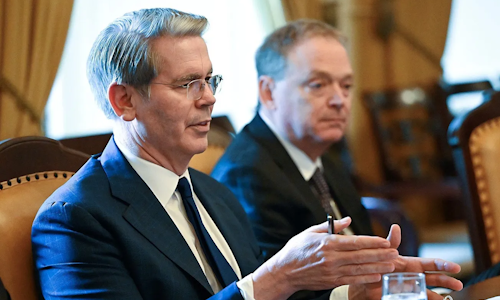By Richard Haass, Project Syndicate | May 2, 2025
The foreign policy of Donald Trump's second administration is and will remain more unilateralist than isolationist. Less clear is whether Trump will move to reduce tariffs imposed on friends and foes alike, rethink his pro-Russian stance on Ukraine, and press Israel to modify its approach to Gaza and the West Bank.
NEW YORK – We are barely 100 days into US President Donald Trump’s second term, but much is already clear. Trump 2.0 is starkly different: more confident and surrounded by a team determined to implement a far more sweeping agenda. Those staffing the administration – amplifiers more than restrainers, enablers more than guardrails – spent the past four years preparing for this moment.
Trump 2.0 is an activist, imperial presidency, at home and abroad. He seems to be everywhere, dominating public space and private conversations alike in much of the world. The contrast with his predecessor President Joe Biden could not be starker.
The administration’s principal policy goal thus far has been to make good on Trump’s campaign pledge to secure the United States’ southern border. But import tariffs – an across-the-board 10% baseline levy, plus additional country-specific tariffs, reaching 145% in China’s case – have become the defining initiative of his presidency.
Foreign policy is also substantially changed. The US has shifted from being a steadfast supporter of Ukraine to tilting decidedly in Russia’s favor. The shift appears to be motivated by a clear dislike for Ukrainian President Volodymyr Zelensky and an embrace of Russian President Vladimir Putin for reasons unknown.
Trump, who boasted during his campaign that all he needed was a day to end the war, which he regularly blames on Biden and Zelensky, is now talking about walking away from diplomacy to end the war entirely. He is finding it difficult to make good on his campaign promise, in no small part because his pro-Russia policy fails to give Putin any incentive to compromise or Zelensky the confidence to do so. The agreement to establish a US-Ukraine Reconstruction Investment Fund should help, but, to achieve a cessation of hostilities, much more will need to be done to assist Ukraine.
Europe and America’s other traditional allies receive no special treatment, either. This is certainly the case with tariffs, which tellingly spared Russia but severely hit Japan, South Korea, and Taiwan. Vice President J.D. Vance traveled to Munich in February to ignite a cultural clash with Europeans, while Defense Secretary Pete Hegseth openly raised doubts about the US commitment to Europe at NATO headquarters. This has spurred European preparations to support Ukraine if American assistance wanes and to achieve strategic self-sufficiency more broadly.
In the Middle East, the administration launched what could well prove to be a promising negotiation with Iran. The stage was set by Israeli military action against Iran and its proxies, the fall of the Assad regime in Syria, and Iran’s worsening economy, all of which makes backing away from its nuclear program to avoid military attack and secure sanctions relief particularly attractive. If the Trump administration is willing to allow Iran limited uranium enrichment – a concession that may be required to secure a deal – it can expect criticism from some in the US and Israel. But Trump is strong enough to weather the pushback if it comes.
Otherwise, the Trump administration has essentially given Israel’s government a free hand to do what it wants in both Gaza and the West Bank. It seems to have lost interest in extending the Hamas-Israel ceasefire, as this would put it at odds with Israeli Prime Minister Binyamin Netanyahu, who appears to prioritize his coalition’s survival, through continuing military operations in Gaza, over freeing the remaining hostages.
Gone is pressure on Israel to rein in its military operations or to even allow humanitarian aid into Gaza, which is almost two months into a full blockade. Trump’s own proposal for Gaza, to empty it of its two million Palestinian inhabitants and to rebuild a new Riviera, went nowhere, but seems to have emboldened the Israeli government to depopulate, occupy, and potentially settle large swaths of the enclave.
In the West Bank, the Trump administration rescinded Biden’s sanctions on settlers who commit acts of violence against Palestinians and/or their property. There is no call on Israel to refrain from settlement activity or any penalty for not doing so. Indeed, this is the first US administration in modern memory not to push Israelis and Palestinians to narrow their differences. What interest there is in reconciliation is focused almost exclusively on facilitating diplomatic normalization between Israel and Saudi Arabia, a prospect set back by Israel’s continued use of armed force in Gaza and rejection of any political agenda to address Palestinian aspirations.
The most unexpected dimension of US foreign policy, one neither previewed in Trump’s first term nor during the campaign, has been the focus on the Western Hemisphere. Canada and Mexico were singled out for early tariffs over alleged failures to control their borders. There were also heavy-handed calls to assert US sovereignty over the Panama Canal, Greenland, and Canada. More than anything else, these goals have triggered an anti-American backlash – even flipping the outcome of Canada’s recent federal election.
There is also what might be described as an amoral slant to US foreign policy. The Trump administration has all but ignored the weakening of democracy in countries such as Turkey and Israel, and has slashed support for democracy promotion efforts around the world.
The biggest foreign-policy uncertainty remains China. On one hand, Trump granted TikTok waivers that allowed it to remain on Americans’ phones, despite uncertainty about whether he has the authority to do so. He continues to speak highly of Chinese President Xi Jinping and expresses confidence that the US and China will reach a deal.
But the massive tariffs he has levied on China mean that the US and Chinese economies will increasingly separate, if not actually decouple. Whether the tariffs are an attempt to gain bargaining leverage or are ends in themselves remain perhaps the biggest question in Sino-US relations.
Overall, Trump 2.0’s foreign policy is more unilateralist than isolationist. This will remain the case. Less clear is the extent to which Trump will move to reduce tariffs, rethink his pro-Russian stance on Ukraine, and press Israel to modify its approach to Gaza and the West Bank – policies that could revive US and global economic growth and bring peace to two regions that have known little of it. Much will depend on the choices of a man who, for better or worse, is already among the most consequential of US presidents.
Richard Haass, President Emeritus of the Council on Foreign Relations, senior counselor at Centerview Partners, and Distinguished University Scholar at New York University, previously served as Director of Policy Planning for the US State Department (2001-03), and was President George W. Bush's special envoy to Northern Ireland and Coordinator for the Future of Afghanistan. He is the author of The Bill of Obligations: The Ten Habits of Good Citizens (Penguin Press, 2023) and the weekly Substack newsletter Home & Away.
Copyright Project Syndicate
TIPP Takes
Geopolitics, Geoeconomics, And More
1. Ukraine War 'Not Ending Soon': Vance, Rubio Cast Doubt On Quick Peace Deal With Russia - RFE/RL
"I think we know where Ukraine is, and we know where Russia is right now…. They're closer, but they're still far apart," Secretary of State Marco Rubio said on Fox News.

Vice President JD Vance, speaking in a separate interview on the network, went further, saying the war in Ukraine is not going to end "any time soon." Rubio said if there isn't a real breakthrough on the war in Ukraine in the near future, President Donald Trump will have to decide how much more time to dedicate to the negotiation process.
2. Bessent Hails ‘Historic’ U.S.-Ukraine Economic Deal - TIPP Insights
Treasury Secretary Scott Bessent praised a new economic agreement between the United States and Ukraine, calling it a “historic economic partnership.”

The deal grants the U.S. preferential access to Ukrainian mineral deals while also providing funding for Ukraine’s postwar recovery. “We look forward to quickly operationalizing this agreement,” Bessent said in a statement, underscoring the strategic and economic importance of closer U.S.-Ukraine ties.
3. China ‘Evaluating’ U.S. Offer To Engage In Trade Negotiations - The Guardian
Beijing is “evaluating” the U.S. offer to engage in trade negotiations, the Chinese government has said. This comes a week after Donald Trump claimed talks were already under way.

China’s commerce ministry said: “The U.S. has recently taken the initiative on many occasions to convey information to China through relevant parties, saying it hopes to talk with China.” The commerce ministry also said that Washington needed to show “sincerity” in negotiations and that it should not engage in “coercion and extortion”.
4. TikTok Fined $600M For Sending EU Data To Chinese Servers - UPI
The Irish Data Protection Commission fined TikTok $600 million for illegally sending personal data of Europeans to Chinese servers.

The DPC decided TikTok's actions violated the European Union's General Data Protection Regulation by transferring the data and not providing sufficient transparency to users. TikTok was also ordered to bring its data processing into compliance within 6 months.
5. Rare-Earth Prices Triple To New Records On China Export Curbs - Nikkei Asia
Prices of rare-earth metals have reached record highs in the weeks since China clamped down on exports of the key materials used in electric vehicles, wind turbines and other items amid a tit-for-tat trade war with the U.S.

The price of dysprosium in Europe – the benchmark for the material outside China – tripled from the start of April to $850 per kilogram as of Thursday, according to Argus Media. Terbium increased to $3,000 per kilogram from $965. China is the world's leading producer of such heavy rare-earth metals as dysprosium.
6. Activist Aid Ship Hit By Drones On Way To Gaza, Says NGO - Reuters
A Gaza-bound ship carrying humanitarian aid and activists was, according to its organizers, bombed by drones in international waters early on Friday morning.

Organizers, the Freedom Flotilla Coalition, have alleged that Israel is to blame. A video, verified by Reuters and filmed by those on board as well as from the ship’s CCTV, purports to show the moment the Conscience was struck off the Maltese coast. While the Maltese government has confirmed all on board are safe, the NGO and Swedish activist Greta Thunberg maintained the ship was still in danger.
7. Israel Military Strikes Near Syria's Presidential Palace - D.W.
The strikes came after Israeli Prime Minister Benjamin Netanyahu's government warned it would intervene if Syrian authorities failed to protect the Druze minority.

"This is a clear message to the Syrian regime: We will not allow [Syrian] forces to deploy south of Damascus or any threat to the Druze community," Netanyahu said in a joint statement with Defense Minister Israel Katz. The Druze adhere to a faith that is an offshoot of Ismailism, a branch of Shiite Islam.
8. Trump Orders Global Halt To Iranian Oil Purchases - TIPP Insights
President Donald Trump issued a sharp warning, declaring that any country or individual purchasing Iranian oil or petrochemical products “must stop, now,” or face immediate secondary sanctions.

In a post styled as an official directive on Truth Social, Trump stated that violators would be barred from doing business with the United States “in any way, shape, or form.”
9. Carney Says ‘Old Relationship Over’ Ahead Of Trump Meeting - TIPP Insights
Canada’s newly elected Prime Minister, Mark Carney, announced he will meet with President Donald Trump at the White House on Tuesday.

Speaking at his first news conference since winning Monday’s election, Carney described a recent call with Trump as “very constructive” and emphasized his government’s focus on securing a strong deal for Canada. “Our old relationship, based on steadily increasing integration, is over,” Carney said, hinting at a shift in cross-border cooperation.
10. Over 90 Nations Call For Preserving A-Bomb Memories In U.N. Meeting - Kyodo News
Countries including Japan called for preserving the memories of the devastation caused by nuclear attacks during a preparatory meeting for next year's U.N. nuclear disarmament review conference.

The move to issue the joint statement was led by Japan, with this year marking the 80th anniversary of the U.S. atomic bombings of Hiroshima and Nagasaki. From among nuclear weapons states, Britain was the only one that joined.
11. Global Press Freedom Ebbs To A New Low - RFA
Press freedom is at its lowest ebb globally in more than two decades, Reporters Without Borders said, as economic pressures shake the foundations of journalism.

“Without economic independence, there can be no free press,” the advocacy group, also known as Reporters sans frontières or RSF said in a statement announcing the 2025 iteration of the press freedom index.
The bottom three spots in the 2025 press freedom index were occupied by China, North Korea and Eritrea. The top three countries, from first to third respectively, were Norway, Estonia and the Netherlands.
12. Apple Says Most iPhones Sold In U.S. Will Be From India - D.W.
"A majority of iPhones sold in the U.S. will have India as their country of origin," Apple CEO Tim Cook said while announcing the company's latest quarterly results.

Vietnam, meanwhile, would be the country of origin for almost all iPad, Mac, Apple Watch and AirPod products sold in the United States, Cook added. The statement comes as the tech giant examines ways to mitigate the impact of President Donald Trump's tariff onslaught on its supply chains as well as sales and profit margins.
13. 1 Chinese Stock to Buy Hand Over Fist - The Motley Fool
Leading Chinese automaker BYD may not be a household name in the U.S. market, as the company doesn't sell vehicles here currently, but it's taken the world by storm in recent years.

Last year, BYD overtook Tesla on overall annual revenue, reporting $107 billion compared to Tesla's $98 billion.
BYD checks just about every box an investor could ask for today. It's posting strong growth on both the top and bottom lines, expanding successfully outside of its home market, leading in technology, and boasts competitive advantages with its vertical integration and battery costs.
14. Bear Market Is Coming With S&P 500 Rally Stalling Soon, DeMark Says - Bloomberg
U.S. stocks are in for another drop that will eventually lead to a bear market in the coming months, according to veteran technical strategist Tom DeMark, who accurately called this year’s top in February and subsequent April low.

DeMark — a closely-followed analyst who’s advised billionaire investors including Paul Tudor Jones, Leon Cooperman and Steve Cohen — uses a system for predicting where markets will move, derived from a half century of chart gazing that’s based on mathematical relationships.
15. Britain To Bar Consumers From Borrowing To Buy Crypto Under New Regime - Reuters
Britain is to restrict consumers' use of credit cards to buy crypto and their access to crypto lending products, the regulator said, a move aimed at improving protection as crypto assets are regulated for the first time.

The finance ministry this week said it would bring cryptocurrencies under compulsory regulation, with exchanges, dealers and issuers all coming under the existing rulebook.
16. High Blood Pressure, Diabetes Deadlier In Men - HealthDay News
Men are more likely than women to die from high blood pressure, diabetes and HIV/AIDS, after shrugging off medical care for the conditions, a new study says.

These differences crop up even though men and women are as likely to develop either high blood pressure or diabetes, researchers reported in the journal PLOS Medicine. The results show that more needs to be done to encourage men to participate in preventive care and health care, researchers said.






